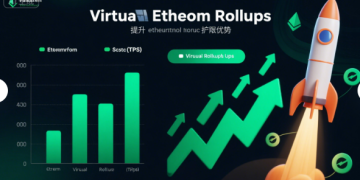In the ever-evolving Ethereum ecosystem, Virtual Ethereum Rollups have emerged as a groundbreaking layer 2 scaling solution, addressing the network’s long-standing challenges of high gas fees and limited throughput. These innovative protocols combine the best of zero-knowledge (ZK) cryptography and state channel technology to enable near-instant, gas-free transactions while maintaining Ethereum’s security and decentralization. In this article, we’ll explore how Virtual Rollups work, their advantages, and their pivotal role in shaping Ethereum’s future.
What Are Virtual Ethereum Rollups? A Revolutionary Layer 2 Solution
Virtual Ethereum Rollups, often referred to as ZK state channels, represent a paradigm shift in blockchain scalability. Unlike traditional rollups (Optimistic or ZK), which batch transactions off-chain and submit proofs to Ethereum, Virtual Rollups take a hybrid approach. They allow users to conduct unlimited transactions within private, trustless channels using ZK accumulators and BLS signatures, while assets remain securely locked on the Ethereum mainnet.
For example, in a gaming or DeFi application, users deposit funds into a smart contract and generate a shared session key. All subsequent transactions—such as in-game actions or token swaps—are signed by participants and recorded in a Merkle tree, with only the final state submitted to Ethereum. This design eliminates gas fees for individual transactions and ensures finality in milliseconds, mirroring Web2 user experiences.
How Do Virtual Ethereum Rollups Work? A Deep Dive into Mechanics
The mechanics of Virtual Rollups are rooted in cryptographic innovation. Here’s a step-by-step breakdown:
- Asset Locking: Users deposit ETH or ERC-20 tokens into a smart contract, creating a “virtual balance” tied to their Ethereum addresses.
- Session Key Generation: Participants generate a shared session key using their wallet addresses, enabling secure peer-to-peer interactions.
- Off-Chain Execution: Transactions are executed off-chain, with each state change signed by all participants and stored in a Merkle tree.
- Finality on Ethereum: When a user exits the channel, a BLS signature of the final state is submitted to Ethereum. If disputes arise, a slashing mechanism penalizes malicious actors after an 8-hour grace period.
This architecture allows Virtual Rollups to handle unlimited participants at a constant cost, a critical advantage over traditional state channels that were limited to two users.

Key Advantages of Virtual Ethereum Rollups
1. Unmatched Scalability
Virtual Rollups can process thousands of transactions per second (TPS) with near-zero latency, far exceeding Ethereum’s current 15–30 TPS capacity. By 2025, Ethereum aims to achieve 100,000+ TPS through sharding and rollup enhancements, with Virtual Rollups playing a central role in this scalability leap.
2. Cost Efficiency
Gas fees for individual transactions are eliminated, making Virtual Rollups ideal for microtransactions, gaming, and DeFi applications. Users only pay a small fee when exiting the channel, significantly reducing costs compared to layer 1 transactions.
3. Security and Decentralization
Virtual Rollups inherit Ethereum’s security through the mainnet’s consensus mechanism. The use of ZK proofs ensures transaction validity without revealing sensitive data, while BLS signatures and slashing penalties deter malicious behavior.
4. Flexibility and Interoperability
Dynamic channels allow users to join or leave mid-session, and cross-chain compatibility (e.g., integrating with Solana or Cosmos) is on the horizon. For instance, Ontropy’s Virtual Rollups roadmap outlines plans to support multiple blockchains by 2025, enabling unified liquidity across networks.
Challenges and Limitations of Virtual Ethereum Rollups
While Virtual Rollups offer immense promise, they’re not without challenges:
- Technical Complexity: Implementing ZK proofs and BLS signatures requires sophisticated cryptographic expertise, potentially slowing adoption.
- User Experience: Despite advancements, interacting with layer 2 solutions still demands technical knowledge, though projects like Ontropy are streamlining the process with Metamask integration.
- Adoption Barriers: Convincing developers to migrate existing dApps to Virtual Rollups requires significant effort, though compatibility with EVM (Ethereum Virtual Machine) eases this transition.
Real-World Use Cases of Virtual Ethereum Rollups
1. Gaming and Social Platforms
Virtual Rollups enable gas-free in-game transactions and instant settlements, crucial for metaverse economies. Projects like Ontropy are already testing this with closed beta integrations for GameFi dApps.
2. Decentralized Finance (DeFi)
By 2025, Virtual Rollups aim to support decentralized exchanges (DEXes) and lending protocols, allowing users to trade across multiple chains in a unified order book. This could reduce slippage and enhance liquidity.
3. Cross-Chain Transactions
With upcoming updates like Virtual Rollup 2.1, users will be able to deposit assets from Solana, Cosmos, and other chains into a single Virtual Rollup, bridging fragmented liquidity.
The Future of Virtual Ethereum Rollups and Ethereum Scaling
Vitalik Buterin has emphasized that Stage 1+ Rollups—combining fraud proofs and ZK technology—will dominate Ethereum’s scaling landscape by 2025. Virtual Rollups align with this vision, offering a hybrid model that balances speed, security, and decentralization.
As Ethereum transitions to sharding and Danksharding, Virtual Rollups will become even more critical. By 2025, they’re expected to handle millions of daily transactions while maintaining sub-second finality, positioning Ethereum as the backbone of Web3.
Conclusion: Stay Ahead with Bitora’s Insights into Ethereum’s Scaling Innovations
Virtual Ethereum Rollups are not just a solution—they’re a catalyst for Ethereum’s evolution. By unlocking scalability, reducing costs, and enhancing user experience, they’re paving the way for mass adoption of decentralized applications.
At Bitora, we’re committed to delivering real-time insights into Ethereum’s scaling ecosystem. Whether you’re a developer, investor, or crypto enthusiast, our platform provides the tools and analysis to navigate the future of Web3. Stay ahead with Bitora’s comprehensive coverage of Virtual Rollups, layer 2 solutions, and Ethereum’s roadmap.
For the latest updates on Virtual Ethereum Rollups and beyond, visit Bitora.


























